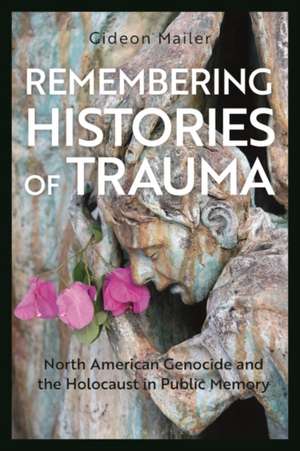Remembering Histories of Trauma: North American Genocide and the Holocaust in Public Memory
Autor Gideon Maileren Limba Engleză Paperback – 20 apr 2022
| Toate formatele și edițiile | Preț | Express |
|---|---|---|
| Paperback (1) | 174.95 lei 22-36 zile | +47.57 lei 5-11 zile |
| Bloomsbury Publishing – 20 apr 2022 | 174.95 lei 22-36 zile | +47.57 lei 5-11 zile |
| Hardback (1) | 499.83 lei 43-57 zile | |
| Bloomsbury Publishing – 20 apr 2022 | 499.83 lei 43-57 zile |
Preț: 174.95 lei
Preț vechi: 201.62 lei
-13% Nou
Puncte Express: 262
Preț estimativ în valută:
33.48€ • 34.86$ • 28.30£
33.48€ • 34.86$ • 28.30£
Carte disponibilă
Livrare economică 17 februarie-03 martie
Livrare express 31 ianuarie-06 februarie pentru 57.56 lei
Preluare comenzi: 021 569.72.76
Specificații
ISBN-13: 9781350240636
ISBN-10: 135024063X
Pagini: 272
Ilustrații: 25 bw illus
Dimensiuni: 156 x 234 x 20 mm
Greutate: 0.48 kg
Editura: Bloomsbury Publishing
Colecția Bloomsbury Academic
Locul publicării:London, United Kingdom
ISBN-10: 135024063X
Pagini: 272
Ilustrații: 25 bw illus
Dimensiuni: 156 x 234 x 20 mm
Greutate: 0.48 kg
Editura: Bloomsbury Publishing
Colecția Bloomsbury Academic
Locul publicării:London, United Kingdom
Caracteristici
Brings
together
material
and
debates
from
Early-American
history,
Holocaust
studies,
Native
American
studies,
First
Nations
studies,
memory
studies,
and
museum
studies
Notă biografică
Gideon
MailerAssociate
Professor
and
Chair
of
the
History
Program
at
University
of
Minnesota,
Duluth,
USA.
A
contributor
to
the
Baeumler
Kaplan
Holocaust
Commemoration
Project
and
other
initiatives
connecting
American
Indian
Studies
and
Holocaust
Studies,
he
has
also
helped
to
spearhead
a
new
Museum
Studies
program
with
the
intent
to
integrate
Indigenous
memory
and
Holocaust
studies
at
his
institution.
Cuprins
Introduction:
Traumatic
Memory
and
the
Indigenous-Jewish
Connection1.
Biological
Determinism
and
the
Problem
of
Perpetrator
Intent2.
Indigenous
People,
Jews,
and
the
Americanization
of
the
Holocaust3.
Indigenous
Genocide,
the
Holocaust,
and
European
Public
Memory4.
Public
Memory
and
the
Problem
of
Imperial
Power5.
Traumatic
Memory,
Assimilation,
and
Cultural
RenewalConclusion
Recenzii
With
great
reflection
and
compassion,
Gideon
Mailer
identifies
how
genocide
and
massacre
have
impacted
Jews
and
Indigenous
peoples,
not
only
in
the
political,
cultural
and
social
spheres,
but
also
in
the
imaginaries
of
these
groups,
their
collective
archives
so
that
they
retain
a
kinship
previously
unexamined.
This is an ambitious, generous, and much needed book. It addresses anxieties that have made it hard to see links between the experience and representation of anti-Jewish and anti-indigenous genocides. More impressive still, it does so without overly generalizing the experiences and sensibilities of indigenous people or Jews themselves or reducing them solely to victimhood. It should foster many productive and critical discussions. I hope it will be widely read.
This is an ambitious, generous, and much needed book. It addresses anxieties that have made it hard to see links between the experience and representation of anti-Jewish and anti-indigenous genocides. More impressive still, it does so without overly generalizing the experiences and sensibilities of indigenous people or Jews themselves or reducing them solely to victimhood. It should foster many productive and critical discussions. I hope it will be widely read.
